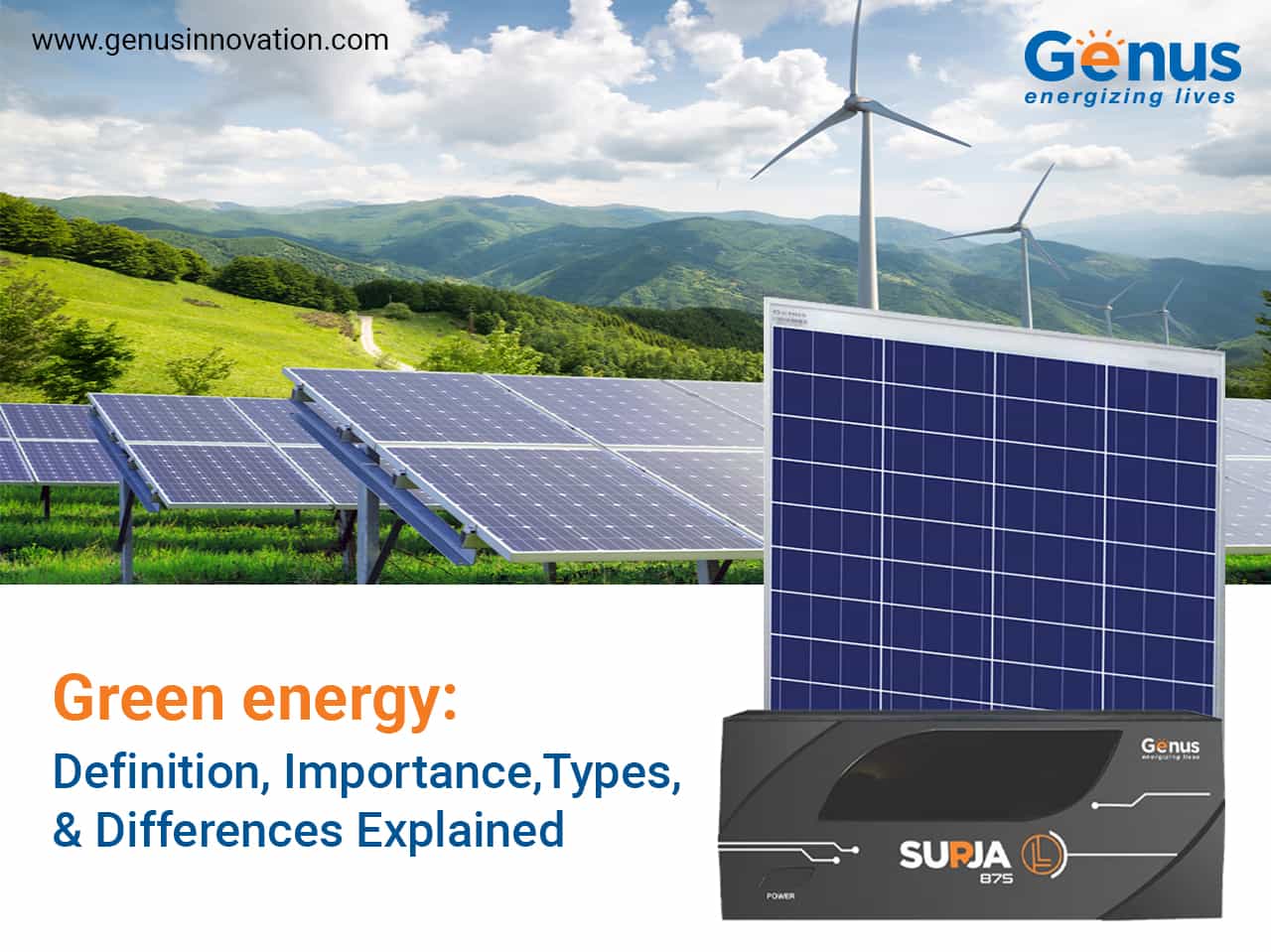What is Green Energy?
Green energy, also known as renewable energy, refers to power derived from natural and sustainable sources such as sunlight, wind, and water. Unlike traditional energy sources like coal or oil, green energy doesn't release harmful greenhouse gases or contribute to environmental degradation. At Genus Innovation, we harness the power of green energy to promote sustainability and offer top-tier solar solutions for homes and businesses alike. Our solar products are designed to maximize efficiency while minimizing environmental impact, ensuring long-term benefits for both the planet and your wallet.

Why Does Green Energy Matter for the Environment?
Green power plays a crucial role in preserving our environment due to several key factors. Firstly, it replaces the harmful effects of fossil fuels with cleaner alternatives like wind, water, and sunlight. These resources are renewable, meaning they won't deplete over time, and they significantly reduce pollution levels compared to conventional energy sources. Additionally, throughout their lifecycle, green energy systems emit minimal greenhouse gases, helping protect ecosystems and mitigate climate change. Economically, green energy offers stability since it's typically sourced locally, shielding consumers from volatile price fluctuations associated with global markets. Furthermore, investing in green technologies supports job creation; globally, renewable energy initiatives contributed to approximately 11 million jobs back in 2018 (TWI Global). Lastly, embracing green energy promotes resilience within energy infrastructures, making them less reliant on centralized grids and better equipped to handle weather-related challenges.
What Types of Green Energy Exist?
There are several categories of green energy originating from diverse natural phenomena:
1. Solar Power
Solar energy captures sunlight and converts it into electricity through photovoltaic panels. When sunlight strikes these panels, electrons move, creating an electric current. This direct current is then converted into alternating current suitable for household use via inverters. Installing a Genus solar system at home allows you to tap into this abundant resource efficiently while reducing reliance on non-renewable sources.
2. Wind Power
Wind turbines generate electricity by converting kinetic energy from moving air masses into mechanical motion. The sun indirectly drives winds by heating Earth unevenly, causing air currents. Wind farms operate sustainably without emitting pollutants during operation, offering a reliable means of producing clean electricity.
3. Hydropower
Hydropower utilizes flowing water to drive turbines connected to generators. By controlling water release from dams or rivers, operators control output levels according to demand patterns. This method provides consistent baseload capacity alongside peak load management capabilities.
4. Biogas
Biogas arises from anaerobic digestion processes involving organic waste materials such as kitchen scraps or livestock excrement. Microorganisms break down these substances under oxygen-free conditions, releasing methane-rich biogas ready for combustion purposes. Besides providing useful fuel, residual solids serve as valuable fertilizers enhancing soil fertility levels.
5. Biomass Conversion
Biomass encompasses solid organic matter processed into biofuels capable of replacing petroleum derivatives across various sectors including transportation and industry. While combustion releases COâ‚‚ back into the atmosphere, overall net emissions remain lower than those attributed to crude oil extraction activities.
How Do Green Energy Sources Compare With Traditional Options?
While similar in scope, distinctions exist between "green" and "renewable." All green energies fall under the broader umbrella term renewables but emphasize environmental friendliness above all else. For instance, although tidal waves qualify as renewable because they recur periodically, they might disrupt local marine habitats necessitating careful planning prior implementation. On the other hand, solar panels pose negligible risks to wildlife while delivering substantial returns over their operational lifetime spans exceeding decades. Moreover, advancements in battery storage technology coupled with intelligent grid management strategies further enhance reliability metrics ensuring uninterrupted service delivery even during adverse weather events.
At Genus Innovation, we pride ourselves on developing innovative solutions aligned with global sustainability goals. Whether upgrading existing facilities or starting fresh projects entirely focused on utilizing eco-conscious methods, trust us to deliver exceptional results tailored specifically towards meeting individual client needs effectively yet responsibly. Contact us today to learn more about how we can assist transforming your property into an environmentally conscious haven!
Coconut Diethanol Amide Cdea 78%,Coconut Diethanol Amide 78%,Cdea 78%
Tianjin Centerstar Chemical Co., LTD. , https://www.centerstarchem.com